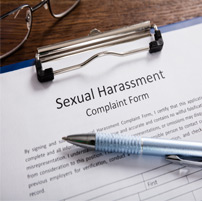 Following a comprehensive study begun in 2015, the EEOC has prepared the 2017 Enforcement Guidance on Unlawful Harassment as a tool for employers on how to prevent and remediate sexual and other forms of workplace harassment. Of the 90,000 claims received by the EEOC in 2015, almost one-third contained allegations of workplace harassment against a protected class. The complaints included harassment and discrimination based on gender identity, sex, sexual orientation, pregnancy, race, color, national origin, disability, age, ethnicity, and religion.
Following a comprehensive study begun in 2015, the EEOC has prepared the 2017 Enforcement Guidance on Unlawful Harassment as a tool for employers on how to prevent and remediate sexual and other forms of workplace harassment. Of the 90,000 claims received by the EEOC in 2015, almost one-third contained allegations of workplace harassment against a protected class. The complaints included harassment and discrimination based on gender identity, sex, sexual orientation, pregnancy, race, color, national origin, disability, age, ethnicity, and religion.
The #MeToo movement has drawn attention to problems existing in the entertainment business; however the issue of harassment is pervasive and exists across all industries. The EEOC guidance provides concrete and effective methods for change. It replaces earlier guidelines set out in the 1990s and explains the legal standards for unlawful harassment.
Key Measures for Preventing Harassment
The EEOC reports that there are five key measures that have been shown to be effective in preventing harassment.
- Leadership – must be strong and committed
- Accountability – must be regular and proven
- Harassment policies – must be both comprehensive and robust
- Complaint procedures – must be reliable and accessible with prompt and thorough investigations of complaints of harassment
- Training – must be tailored to the specific workforce, done routinely in an interactive manner and preferably in person
It is crucial that these five measures be implemented in concert as they are interrelated and one cannot be effective without the others in place. A culture of respect must be developed and supported by committed workplace leaders. However, such a culture cannot be maintained without effective training programs and protocols that hold employees accountable to comprehensive harassment policies.
Effective Systems for Reporting Complaints
The EEOC provides detailed information on how to create an effective system for reporting complaints. An effective system must welcome questions, concerns and complaints from employees and encourage them to report potential problems early. The system must function impartially and investigate promptly and thoroughly while always treating alleged victims, alleged harassers, and any other participants such as witnesses with respect. The privacy of the process participants must be protected to the fullest extent possible. It is crucial that the complaint reporting system be fully resourced and supported to ensure its effectiveness.
Training Programs
Equally important is that those receiving, investigating and resolving complaints are competent and well-trained. Their job involves documenting the entire complaint process from initial report, through the investigation until its resolution. They must weigh all the credible evidence from all relevant parties and create a report that details the investigation, findings, recommendations, and disciplinary actions if any are taken. Often employers will use a qualified independent attorney investigator to fill this role.
Training programs must be implemented for employees and supervisors alike so that they know how to use the reporting system and can recognize unlawful harassment when they encounter it. Through training the company’s anti-harassment policies should be made clear as well as the consequences for violating them.
Employers should review their policies and procedures to ensure compliance with the new EEOC guidance. Using the tools contained in the updated guide, prevention and remediation of workplace harassment can be more effective.
Atlantic City Employment Lawyers at Levine Staller Represent Victims of Workplace Harassment
If you have experienced harassment or discrimination on the job, or if you are an employer and are seeking to strengthen your policies and procedures, the dedicated Atlantic City employment lawyers at Levine, Staller, Sklar, Chan & Brown, P.A. can help. Call 609-348-1300 to speak with one of our skilled attorneys or contact us online. For over 35 years we have provided high quality legal services to satisfied clients throughout New Jersey including communities in Atlantic County, Ocean County, and Cape May County.
